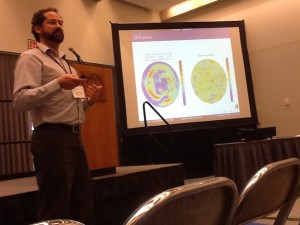This session, organized by Thomas Bellsky, Arizona State University, and Lewis Mitchell, University of Vermont, focused on applications of data assimilation to climate issues. It opened with a talk by Chris Jones of the University of North Carolina at Chapel Hill, where he gave a wonderful overview of data assimilation and how it can be used in climate models. He also detailed the Lagrangian data assimilation problem from a Bayesian viewpoint. Of particular interest was the discussion of new techniques for making subsurface ocean observations, and how this data can be used to initialize climate models.
The second speaker of the session was Juan Restrepo of the University of Arizona. Speaking to a large audience, Juan discussed how to determine whether high temperatures in Moscow are an extreme climate fluctuation or the result of a systematic global warming trend. He detailed the challenges for determining such a trend including inherent multi-scale effects, nonlinear effects, and incomplete knowledge of the climate. He introduced his group’s mathematical methodology for identifying such trends, where their method has the capability to deal with multi-scale time series.
Elaine Spiller of Marquette University spoke on data assimilation applied to a simple kinetic model of a three-dimensional ocean eddy. Their methods fit a bias function modeling the difference between such a kinetic model and the data, and then use the bias-corrected
kinematic model to explore eddy dynamics. Marc Kjerland of the University of Illinois at Chicago discussed techniques for obtaining the evolution of the slow variables for a simple two-scale climate model, to then obtain a correction term for the fast dynamics. A short discussion period was held to informally discuss research, with a focus on the Math Climate Research Network (MCRN) and future MPE2013 events. Lewis Mitchell spoke after the break on finite size Lyapunov exponents and data assimilation, where he focused on systems with slow and fast regimes. Thomas Bellsky spoke on methods for targeting observations with Ensemble Kalman filter techniques. Additionally, he spoke on new parameter estimation techniques, and how this research is important in future climate modeling in order to establish a more rigorous methodology for tuning model parameters.
This session was a great opportunity to both get introduced to some basic concepts from data assimilation and climate science, and to learn about many exciting areas of focused research. Perhaps the best part about such a session is to gather with new and old colleagues to hold further informal discussions over dinner and at future MPE2013 events.
